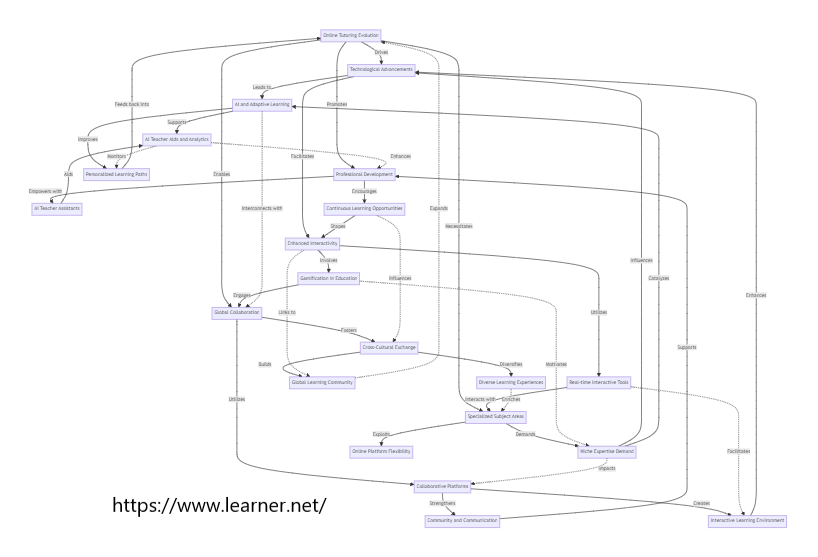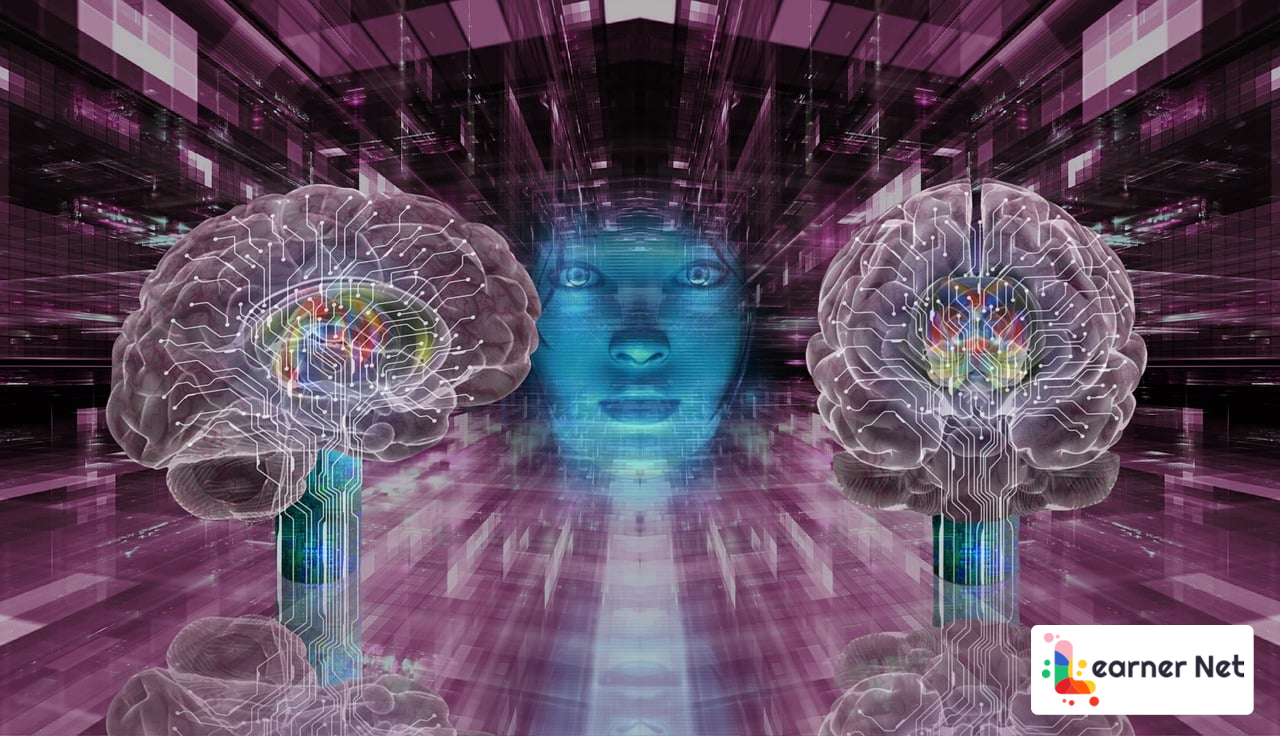Trends and Innovations
In the rapidly changing landscape of education resulting from recent global events, online tutoring has emerged as a vital component, reshaping how students access learning resources and interact with educators. The current state of online tutoring is marked by widespread adoption, fueled by the convenience, necessity, and accessibility it offers to learners globally.
With the advent of digital platforms and the internet, students can connect with tutors across around the world, without being so heavily restricted by the constraints of more traditional educational institutions when compared with online academies.
The education sector is witnessing a paradigm shift, driven by advancements in technology and a growing demand for personalized learning experiences in addition to the global crisis which may or may not be making its return. As traditional teaching methods adapt to the digital realm, educators must stay abreast of the latest developments to maintain and enhance their teaching efficacy and cater to more diverse student requirements.
The importance of exploring trends lies in the potential to revolutionize the way education is delivered. From the integration of artificial intelligence (AI) and virtual reality (VR) as personal Teacher Assistants, to the rise of specialized subject areas, these trends are shaping the future of online tutoring. AI, in particular, plays a major role by introducing features like adaptive learning algorithms and AI Assistants, which tailor educational content to individual student requirements or serve in lieu of a teacher’s aide, capable of performing many of the tasks previously required of the online tutors.
Moreover, staying attuned to innovations ensures that online tutors can provide students with a more engaging and interactive learning environment. “Gamification” elements, collaborative tools, and real-time performance tracking are becoming integral to the online tutoring experience, fostering a more dynamic and effective educational journey for learners.
The current state of online tutoring reflects a burgeoning industry with immense potential for both academics and industry professionals. Exploring trends and innovations is not only beneficial for educators but also essential in meeting the evolving needs of students in a rapidly changing educational landscape. As technology continues to advance, the exploration of new methodologies ensures that online tutoring remains a dynamic and impactful force in the realm of education.
Diagram 1: The Interconnected Ecosystem of Online Tutoring and Technological Advancement.

Technological Advancements
The Learner Net online educational website stands at the forefront of educational innovation, notably through the seamless integration of artificial intelligence or AI in the form of its free AI Assistants for the online tutors.
This integration transforms the online learning experience, enhancing its effectiveness and responsiveness to individual student and tutor requirements. Learner Net offers its tutors to create their free AI Assistant to fulfill virtually any requirements of the online tutors on the site. Each of these AI Assistants can be trained by the individual tutor. While some sites offer AI only to the extent that a single AI Assistant is available for the entire site, Learner Net has moved beyond such restrictions, and allowed for the creation of the Free AI Assistants that can be trained by the individual user.
One remarkable facet of the recent advances in online tutoring is the incorporation of virtual and augmented reality (VR and AR). These technologies offer students immersive learning experiences, transcending traditional boundaries and making abstract concepts more tangible. Whether exploring historical events through VR simulations or dissecting complex scientific phenomena through AR overlays, learners engage with the material in ways that were once inconceivable in traditional education.
However, sites like Meta have further demonstrated that the full potential of this technology may not be readily available to the general public for quite some time.
AI Chatbots and AI Teacher Assistants play a pivotal role in fostering personalized learning within the Learner Net ecosystem. These conversational agents utilize natural language processing and machine learning algorithms to understand the requirements of the individual online tutors, provide instant assistance, and adapt their interactions based on the individual requirements and desires of each tutor.
As Learner Net continues to push the boundaries of online education, the integration of the AI Assistants and AI Chatbots exemplifies its commitment to providing a cutting-edge learning platform. Students benefit from a more engaging, interactive, and personalized educational journey, while online tutors leverage these technological advancements to enhance their teaching methodologies.
The incorporation of AI and immersive technologies at Learner Net marks an evolutionary step towards the future of online tutoring and education as a whole.
Personalized Learning in the Technological Revolution
The exponential expansion of technology has catalyzed a major shift in online education, particularly in the realm of adaptive learning algorithms. These algorithms are revolutionizing the way lesson plans are tailored to meet the individual needs of students.
This advancement marks a significant departure from traditional, one-size-fits-all educational approaches, ushering in an era of highly customized and adaptive learning experiences. The last time there was any similar disruption to the more traditional educational approach was the introduction of the Waldorf-Steiner method, which placed a focus on individual learning styles, though it may have been lacking some in accordance with more traditional scholastic approaches.
Adaptive learning algorithms leverage artificial intelligence and machine learning to analyze vast datasets related to student performance, preferences, and learning styles. This depth of data allows the algorithms to discern patterns and correlations, enabling them to generate personalized lesson plans that cater specifically to the strengths and weaknesses of each student. As a result, learners engage with content that aligns with their unique pace, ensuring a more effective and enjoyable learning journey.
Conversely, the introduction of the AI Assistants for online tutors at Learner Net are not nearly as restrictive as some of the “Off-the-shelf” AI assistant programs on the market today. Where the commercial AI solutions for teaching being sold on the open market are largely restricted based on the input of the developers and the few teachers who actively participated in the Beta testing and revisions, the Learner Net AI Assistants offer the teacher or online tutor to train their AI to assist them directly, in whatever areas they are willing to take the time to train the AI Assistant to incorporate in its functions.
The impact of these technologies extends beyond just personalized content delivery. Adaptive learning algorithms and the AI Assistants can provide online tutors with valuable insights into individual student progress, highlighting areas that may require additional attention or reinforcement. This, in turn, will enable tutors to fine-tune their teaching strategies with precision, addressing specific challenges and optimizing the learning experience for each student.
Moreover, the simplicity with which adaptive learning algorithms operate streamlines the process of tailoring teaching strategies. Online tutors can effortlessly adapt their approach based on real-time feedback from the algorithms, fostering a more dynamic and responsive instructional environment. This seamless integration of technology not only enhances the efficacy of online tutoring but also contributes to a more student-centric, flexible, and adaptive educational landscape.
The impact of exponentially expanding technologies in adaptive learning algorithms is reshaping the landscape of online education, ushering in an era where customized lesson plans and tailored teaching strategies are not just aspirational goals but integral components of a modern and effective learning ecosystem.
Global Collaboration with Distance Learning
The advent and proliferation of online academies, such as Learner Net, have ushered in an era of unprecedented opportunities for cross-cultural learning. These platforms connect tutors and students from diverse corners of the world, creating an enriched and globalized environment that goes beyond traditional educational boundaries.
As a result, online tutors are presented with the unique prospect of engaging with students who bring not only varied academic needs but also distinct cultural perspectives, enriching the learning experience for both the student and the online tutor.
One of the key advantages of online academies is their ability to facilitate a better and more diverse understanding of culture. Tutors interact with students hailing from different countries, backgrounds, and belief systems, fostering a global perspective that transcends geographical limitations. This exposure to diverse viewpoints encourages tutors to broaden their own horizons, integrating new cultural insights into their teaching methodologies.
The collaborative platforms inherent in online academies and sites like Learner Net, play a pivotal role in enhancing the efficaciousness of online education. Connecting tutors and students globally creates a dynamic and interactive learning environment, enabling cross-cultural exchange and collaboration.
Tutors gain valuable insights into the unique learning styles, preferences, and challenges of students from various cultural backgrounds. This information empowers tutors to tailor their teaching methods to be more inclusive and responsive, ensuring that the educational experience is relevant and accessible to a diverse student body.
The global nature of online academies opens the door to collaborative learning initiatives, where even the students from different parts of the world can actively engage with one another. This collaborative aspect not only enriches the academic experience but also cultivates a sense of global community and understanding among learners, leading to a more positive and accepting future on a global scale.
The introduction and expansion of online academies and sites like Learner Net have significantly increased opportunities for cross-cultural learning. Through collaborative platforms, tutors and students connect on a global scale, fostering an environment that promotes cultural diversity, enriches educational experiences, and prepares learners for a more interconnected and globally aware future.
Enhanced Interactivity with Online Education
The amazing growth rate of the technological revolution has dramatically transformed the landscape of online education and distance learning, ushering in an era of enhanced interaction and engagement. These technological strides have not only made education more accessible but have also introduced innovative tools and methodologies that cater to the diverse learning needs of students and work to the benefit of the online tutors.
One noteworthy aspect of this transformation is the integration of gamification elements into educational platforms. Gamification leverages game-like features, such as point systems, rewards, and interactive challenges, to make the learning experience more enjoyable and engaging. By introducing elements of competition and achievement, gamification motivates students to actively participate in their educational journey, fostering a sense of accomplishment and making the learning process more enjoyable.
Digital and online tools, such as interactive whiteboards and collaborative platforms, also play a crucial role in facilitating real-time interaction between students and educators, and even among the students themselves.
Interactive whiteboards, for instance, provide a dynamic and visual learning environment where instructors can illustrate concepts in real time. This tool encourages active participation and enables students to visualize complex ideas, enhancing their understanding of the subject matter. In group or peer collaborations, the integration of these tools enables the students to actively engage and effectively communicate, each with the others.
Collaborative tools amplifies the interactive nature of online education by fostering real-time communication and teamwork among students. Features like chat functions, discussion forums, and collaborative document editing allow learners to engage with their peers and instructors, creating a sense of community and shared learning experiences.
This collaborative aspect not only promotes social interaction but also encourages a more active role in the learning process, as students can contribute ideas, ask questions, and share insights.
The technological revolution has brought about some great changes in online education and distance learning, though who can say for sure what the future will introduce in terms of interactive tools and educational trends?
The integration of gamification elements and the use of digital tools like interactive whiteboards and collaborative platforms have significantly enhanced the interactive and engaging aspects of education, providing students with a more personalized and meaningful learning experience in the digital realm.
Data Analytics and Performance Tracking for Teachers
Recent advancements in technology have significantly streamlined the process of data analytics and performance tracking in the field of online education. These innovations have not only made it easier for educators to assess student progress but have also paved the way for more effective interventions and personalized learning experiences.
One notable aspect of this technological evolution is the integration of AI Teacher Assistants, which play a crucial role in handling these tasks with increased efficiency.
AI Chatbots and AI Virtual Assistants for Tutors and Students
AI Teacher Assistants leverage machine learning algorithms to analyze vast amounts of student data, providing important analytical insights into individual learning patterns and performance trends. By processing this information, AI Teacher Assistants can identify areas where students excel or struggle, allowing educators to tailor their approach to meet the unique needs of each learner.
This personalized feedback fosters a more adaptive and responsive teaching environment in addition to making the job of the online tutor easier and more effective. Data analytics, coupled with AI-driven insights, enables educators to assess student progress comprehensively. By leveraging real-time data, educators gain a deeper understanding of student strengths and weaknesses, facilitating the ability to fully integrate targeted and specific interventions.
The ability to track performance in real time allows for timely adjustments to teaching strategies, ensuring that students receive the support they need precisely when they need it. This dynamic approach to performance tracking contributes to a more responsive and effective educational ecosystem.
As technology continues to advance, the role of AI Teacher Assistants is predicted to grow even further. These intelligent systems will likely become integral components of educational environments, providing ongoing support to educators in data analytics, performance tracking, and personalized learning experiences. The increased reliance on AI Teacher Aides signifies a shift towards more data-driven and adaptive educational practices, ultimately enhancing the quality and effectiveness of online education.
Specialized Subject Areas for Students and Tutors Online
The advent of AI and the technological revolution has ushered in a new era of education, marked by a growing demand for specialized tutors and niche subjects. This radical, if not revolutionary shift has given rise to a plethora of opportunities for educators and has fueled the expansion of online educational platforms, such as Learner Net, that cater specifically to unique skill sets and expertise.
One of the key drivers of this growth is the accessibility provided by online platforms, enabling students worldwide to pursue education in niche subjects that may not be readily available in traditional settings. As AI technology facilitates more personalized and adaptive learning experiences, students are increasingly seeking tutors who possess expertise in specialized fields, allowing them to delve deeper into their individual areas of interest.
Learner Net and similar online platforms have become hubs for connecting students with tutors who offer niche subject expertise. The demand for tutors in more specialized fields such as advanced programming languages, niche scientific disciplines, and specialized arts and humanities subjects has surged, creating a vibrant marketplace for educators with unique skill sets.
As technology continues to advance, the spectrum of niche subjects is expected to expand further, fueling an ever-growing demand for tutors who can guide students on their educational journeys. The flexibility of online platforms allows tutors to reach a global audience, transcending geographical boundaries and connecting with learners who share a passion for specialized knowledge.
The introduction of AI and the technological revolution has not only transformed the landscape of education but has also given rise to a burgeoning demand for tutors specializing in niche subjects. Online platforms like Learner Net are at the forefront of this evolution, providing a dynamic space for educators and students to engage in meaningful and specialized learning experiences.
Professional Development for Tutors Online
The technological revolution has not only reshaped the landscape of education but has also opened up new and exciting opportunities for online tutors to actively engage in their own professional development. Platforms like Learner Net, with its innovative approach to AI integration, empower tutors to create and fully customize their free Online Teacher AI Assistants, marking a significant leap forward in the evolution of online tutoring.
The ability for tutors to personalize AI Assistants at Learner Net translates into a dynamic learning experience, not only for students but also for educators themselves. Tutors can develop and enhance skills that are applicable across various fields, gaining insights into AI applications, customization techniques, and pedagogical strategies tailored to the evolving needs of their peers and the students.
Technological advances, particularly in the realm of AI, introduce continuous and varied learning opportunities for tutors. The availability of free AI Teacher Assistants on Learner Net allows tutors to stay ahead of industry trends, explore cutting-edge teaching methodologies, and harness the power of AI to create immersive and effective learning experiences.
For online tutors, staying updated with industry trends, especially those related to AI and customized teaching tools, is of paramount importance. Learner Net’s provision of the free Online Teacher AI Assistants encourages tutors to embrace these advancements and integrate them into their teaching practices. This not only enhances the quality of education delivered to students but also ensures that tutors remain competitive and proficient in leveraging technology for optimal learning outcomes.
The technological revolution, coupled with the customization of AI features offered by Learner Net, is ushering in a new era of professional development for online tutors. The continuous learning opportunities presented by AI Teacher Assistants underscore the importance of staying updated with industry trends, fostering a culture of innovation and excellence in online education.
Accessibility and Inclusivity with Online Education and Distance Learning
The rapid advances in technological capabilities have significantly contributed to enhancing the accessibility and inclusivity of online education and distance learning. Online tutoring, once considered a privilege for a limited demographic, is now becoming more accessible to diverse groups of learners, breaking down traditional barriers to education. This is especially true even in more remote and primitive areas where the availability of education is severely limited or even inhibited in some instances.
One of the key aspects of increased accessibility is the flexibility that online education offers. Learners from various demographics, including those with tight schedules, geographical constraints, or physical disabilities, can access the same or even better educational resources and engage in tutoring sessions conveniently from the comfort of their homes without having to rely on the traditional educational institutions. This flexibility accommodates individuals who might face challenges in attending traditional, in-person schools and tutoring sessions.
Moreover, the customization options available in online education platforms contribute to creating a more inclusive learning environment. Tutors can adapt their teaching methodologies to cater to the diverse learning needs of students, ensuring that educational content is accessible to individuals with different learning styles, preferences, and abilities. This inclusivity is particularly beneficial for students with specific learning requirements or disabilities, as they can receive tailored support and accommodations.
The integration of assistive technologies further promotes inclusivity in online education. Features such as closed captioning, screen readers, and language translation tools make educational content more accessible to students with a broad and diverse range of individual needs. This technological support ensures that online tutoring is a viable option for learners who may face challenges in traditional educational settings.
The rapid technological advancements in online education and distance learning are revolutionizing the accessibility and inclusivity of tutoring services. These innovations empower a broader range of learners, including those with varying needs and circumstances, to access quality education. As technology continues to evolve, the landscape of online tutoring becomes increasingly inclusive, fostering a learning environment that embraces diversity and addresses the unique requirements of every student.
What Does the Future Hold for Online Tutors and Students
The future of online tutoring is intricately tied to the ongoing technological revolution, with key trends and innovations shaping the landscape of distance learning. Artificial Intelligence (AI) is playing a pivotal role in this transformation, offering personalized learning experiences and enhancing the effectiveness of online tutoring.
The introduction of the free AI Teacher Assistants from Learner Net is merely scratching the proverbial surface.
One of the key trends is the integration of AI-driven tools and platforms into online education. AI-powered algorithms can analyze student learning patterns, assess their strengths and weaknesses, and deliver customized content to cater to individual needs. AI-driven chatbots and virtual assistants further contribute to the interactive and engaging nature of online tutoring sessions, providing instant support and feedback.
As the education industry evolves, there is a growing encouragement for tutors and students alike to adapt to emerging technologies and methodologies. Tutors can leverage AI tools to streamline administrative tasks, allowing them to focus more on the core aspects of teaching. Students benefit from AI-driven assessments, real-time feedback, and personalized learning paths, enhancing their overall educational experience.
Looking ahead, predictions for the impact of near-future technological growth on the education industry are much more than merely profound. The continuous development of AI is expected to lead to more advanced and sophisticated tutoring systems, blurring the lines between human and AI-driven interactions. Virtual and augmented reality technologies may further revolutionize the immersive learning experience, transporting students to virtual classrooms and hands-on simulations.
The shift towards more inclusive and accessible education is likely to continue and increase as well, driven by innovations that cater to an increasingly diverse base of individual learning requirements. The future holds the promise of a globalized and interconnected educational system, where students from various backgrounds can access quality tutoring and educational resources.
The future of online tutoring is marked by the integration of AI, personalized learning experiences, and an ever-expanding array of technological innovations. As educators and learners adapt to these changes, the education industry is poised for a truly fascinating journey, embracing the potential of technology to revolutionize how knowledge is shared and acquired in the digital age.








There are no reviews yet.